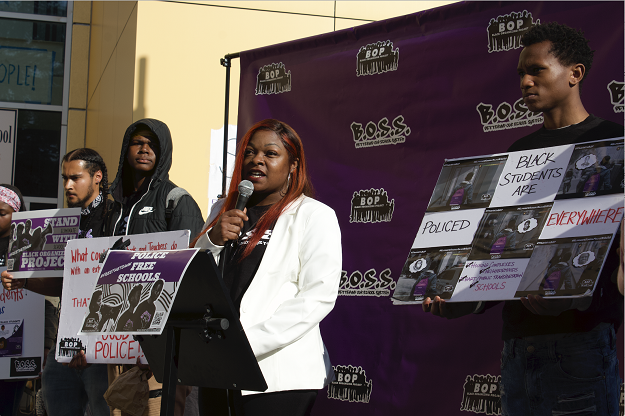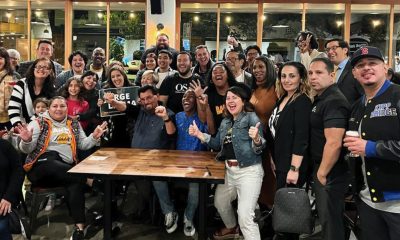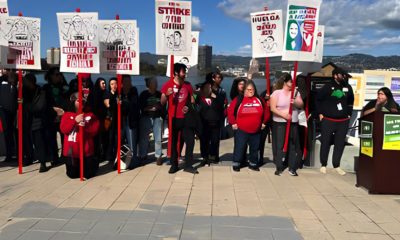Activism
OUSD School Board Approves Black Organizing Project’s School Safety Plan

Oakland’s School Board voted on Wednesday to pass a resolution to implement Phase 1 of a reasonable compliance safety plan, a plan Black Organizing Project, Oakland Unified School Department staff, and community partners formulated to deal with school safety without police presence.
The unanimous vote came after Black Organizing Project (BOP), who describes itself as a “Black member-led community organization working for racial, social, and economic justice,” organized for 10 years. Their goal was to eliminate the Oakland Schools Police Department (OSPD), which works exclusively in OUSD schools. On June 24 of this year, Oakland’s School Board voted to dismantle the department when they passed the George Floyd Resolution to Eliminate the OSPD.
With its Phase 1 plan, BOP is preparing for when OSPD is completely eliminated and in-person schooling starts. The plan outlines alternatives to police intervention for most behavioral issues that result in school settings. OUSD teachers, union representatives, principals, school administrators and public health experts helped to design it. Part of the plan proposes that mental health professionals deal with mental health issues instead of police.
When asked why the plan proposes that health professionals deal with mental health crises, BOP Organizing Director Jessica Black said “it’s better to have people who are trained, skilled, professionals who deal with people’s mental health than to have people who are trained to look for suspects and kill people.”
In anticipation of Wednesday’s vote, BOP organized a week of action, calling on the community to post videos on social media in support of police-free schools, contact board members directly to encourage them to support the safety plan, and prepare public comments for the meeting. During the meeting, community members spoke out in support of BOP’s plan.
BOP is happy that Phase 1 of their safety plan has been adopted by the Board but wants OUSD to remove the remaining OSPD officers and the Chief as soon as possible, as the District has not stuck to the original timeline for police removal that the George Floyd Resolution originally set.
“The goal is to have police off campus,” said BOP Organizing Director Jessica Black. “But we feel the community was undermined because they were supposed to be out now, not later.”
OUSD has extended OSPD Chief Jeff Godown’s contract by 90 days. OSPD officer’s contracts are set to expire on January 11, 2021. Through the George Floyd Resolution, the Board instructed OUSD to terminate these positions by December 31 of this year.
In an interview with The Oakland Post, District 5 Board Director Roseann Torres, who helped write the George Floyd Resolution, said directly terminating OSPD officers and the chief were “not within the board’s purview” as the terminations require action from OUSD, not the board. Torres speculated that the process has been delayed by the pandemic.
The District said it needs more time to eliminate the department.
“The District is well on the way to eliminating the police department, but there are parameters within which the District must work to complete this task,” said OUSD Communications Director John Sasaki when asked why OSPD has not been shut down yet. “A police department, even one the relatively small size of the Oakland Schools Police Department, cannot be shut down overnight.”
BOP also wants more community involvement in dealing with safety in schools, including input from teachers and students and plans to include that involvement in Phase 2 of their safety plan.
“Instead of top down we need [school safety] to come from the bottom up,” said Black. “We are the ones who keep us safe, and it’s going to take the parents, the students, the teachers, the community members and administrators to make it work.”
Activism
Oakland Post: Week of April 24 – 30, 2024
The printed Weekly Edition of the Oakland Post: Week of April 24 – 30, 2024

To enlarge your view of this issue, use the slider, magnifying glass icon or full page icon in the lower right corner of the browser window. ![]()
Activism
Oakland Post: Week of April 17 – 23, 2024
The printed Weekly Edition of the Oakland Post: Week of April 17 – 23, 2024

To enlarge your view of this issue, use the slider, magnifying glass icon or full page icon in the lower right corner of the browser window. ![]()
Activism
Oakland Schools Honor Fred Korematsu Day of Civil Liberties
Every Jan. 30, OUSD commemorates the legacy of Fred Korematsu, an Oakland native, a Castlemont High School graduate, and a national symbol of resistance, resilience, and justice. His defiant stand against racial injustice and his unwavering commitment to civil rights continue to inspire the local community and the nation. Tuesday was “Fred Korematsu Day of Civil Liberties and the Constitution” in the state of California and a growing number of states across the country.

By Post Staff
Every Jan. 30, OUSD commemorates the legacy of Fred Korematsu, an Oakland native, a Castlemont High School graduate, and a national symbol of resistance, resilience, and justice.
His defiant stand against racial injustice and his unwavering commitment to civil rights continue to inspire the local community and the nation. Tuesday was “Fred Korematsu Day of Civil Liberties and the Constitution” in the state of California and a growing number of states across the country.
One OUSD school is named in his honor: Fred T. Korematsu Discovery Academy (KDA) elementary in East Oakland.
Several years ago, founding KDA Principal Charles Wilson, in a video interview with anti-hate organization “Not In Our Town,” said, “We chose the name Fred Korematsu because we really felt like the attributes that he showed in his work are things that the children need to learn … that common people can stand up and make differences in a large number of people’s lives.”
Fred Korematsu was born in Oakland on Jan. 30, 1919. His parents ran a floral nursery business, and his upbringing in Oakland shaped his worldview. His belief in the importance of standing up for your rights and the rights of others, regardless of race or background, was the foundation for his activism against racial prejudice and for the rights of Japanese Americans during World War II.
At the start of the war, Korematsu was turned away from enlisting in the National Guard and the Coast Guard because of his race. He trained as a welder, working at the docks in Oakland, but was fired after the bombing of Pearl Harbor in 1941. Fear and prejudice led to federal Executive Order 9066, which forced more than 120,000 Japanese Americans out of their homes and neighborhoods and into remote internment camps.
The 23-year-old Korematsu resisted the order. He underwent cosmetic surgery and assumed a false identity, choosing freedom over unjust imprisonment. His later arrest and conviction sparked a legal battle that would challenge the foundation of civil liberties in America.
Korematsu’s fight culminated in the Supreme Court’s initial ruling against him in 1944. He spent years in a Utah internment camp with his family, followed by time living in Salt Lake City where he was dogged by racism.
In 1976, President Gerald Ford overturned Executive Order 9066. Seven years later, the 9th Circuit Court of Appeals in San Francisco vacated Korematsu’s conviction. He said in court, “I would like to see the government admit that they were wrong and do something about it so this will never happen again to any American citizen of any race, creed, or color.”
Korematsu’s dedication and determination established him as a national icon of civil rights and social justice. He advocated for justice with Rosa Parks. In 1998, President Bill Clinton gave him the Presidential Medal of Freedom saying, “In the long history of our country’s constant search for justice, some names of ordinary citizens stand for millions of souls … To that distinguished list, today we add the name of Fred Korematsu.”
After Sept. 11, 2001, Korematsu spoke out against hatred and discrimination, saying what happened to Japanese Americans should not happen to people of Middle Eastern descent.
Korematsu’s roots in Oakland and his education in OUSD are a source of great pride for the city, according to the school district. His most famous quote, which is on the Korematsu elementary school mural, is as relevant now as ever, “If you have the feeling that something is wrong, don’t be afraid to speak up.”
-

 Community2 weeks ago
Community2 weeks agoFinancial Assistance Bill for Descendants of Enslaved Persons to Help Them Purchase, Own, or Maintain a Home
-

 Activism4 weeks ago
Activism4 weeks agoOakland Post: Week of April 3 – 6, 2024
-

 Business2 weeks ago
Business2 weeks agoV.P. Kamala Harris: Americans With Criminal Records Will Soon Be Eligible for SBA Loans
-

 Community2 weeks ago
Community2 weeks agoAG Bonta Says Oakland School Leaders Should Comply with State Laws to Avoid ‘Disparate Harm’ When Closing or Merging Schools
-

 Activism3 weeks ago
Activism3 weeks agoOakland Post: Week of April 10 – 16, 2024
-

 Community1 week ago
Community1 week agoOakland WNBA Player to be Inducted Into Hall of Fame
-

 Community1 week ago
Community1 week agoRichmond Nonprofit Helps Ex-Felons Get Back on Their Feet
-

 City Government2 weeks ago
City Government2 weeks agoLAO Releases Report on Racial and Ethnic Disparities in California Child Welfare System
























































